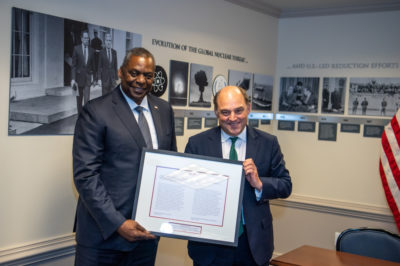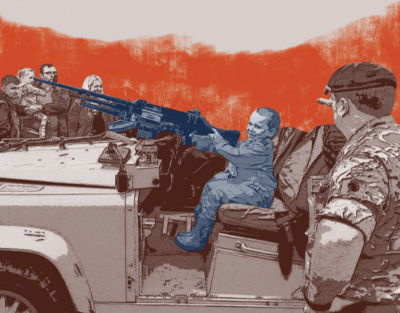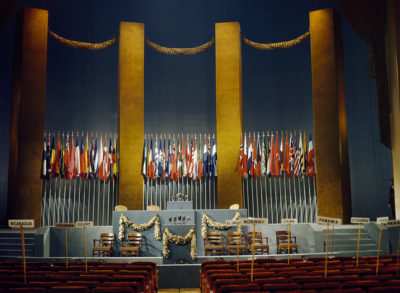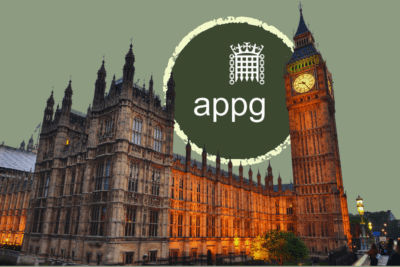Checking in with the neocons

In the week starting 12 July 2021, UK Defence Secretary Ben Wallace was in the United States meeting with his counterpart Lloyd Austin. The visit was dominated by a trip to the Pentagon and the signing of a one-year extension to the US-UK Statement of Intent Regarding Enhanced Cooperation on Carrier Operations and Maritime Power Projection .
But the trip also included a speech at right-wing think-tank The American Enterprise Institute (AEI): a hawkish organisation that unflinchingly supported the 2003 invasion of Iraq and has one of the chief architects of the war, Dick Cheney, on its Board of Trustees (Cheney and his wife, Lynne, were also Senior Fellows over the years). Paul Wolfowitz, Deputy Defence Secretary to Donald Rumsfeld from 2001-2005, is a visiting scholar. Yet, the AEI’s entanglement with the Bush Administration does not end there. As Bush himself stated in a 2007 speech: ‘I admire the AEI a lot. After all, I have been consistently borrowing some of your best people. More than 20 AEI scholars have worked in my administration.’
High-profile hawks from that administration, including John Bolton and Richard Perle, were AEI alumni. In fact Bolton, a veteran of the Reagan administration and also National Security Advisor to Donald Trump, left the Government in 2006 to return to the AEI as a Senior Fellow, only leaving again on his return to government with Trump. So it is hardly surprising that the AEI was also helping bolster the claims that pushed America closer to war. In fact, Vanity Fair went as far as calling them ‘the intellectual command post of the neoconservative campaign for regime change in Iraq’.
Given that Wallace, perhaps accidently, claimed the Iraq War was illegal during a Commons debate in September 2020, a question remains as to why he would choose to make his only speech of the trip at the AEI. The answer may lie in Declassified UK’s uncovering of the organisations courting of certain Conservative Party politicians, including the Prime Minister and Michael Gove, over the past decade. Only a few months after he stepped down a Foreign Secretary, Boris Johnson flew to Washington for a three-day visit to receive and award at the AEI’s annual dinner. He was gifted £16,846 for the occasion – presumably more than was needed to cover his expenses.
Operating below the threshold of war
Key to Wallace’s speech was his position on the nature of conflict in the modern world: there is no longer a clear cut binary between war and peace. Of course, Palestinians, Yemeni’s and many other societies around the world could have told us this years ago as they have been on the sharp end of drone strikes and assassinations that were never classed as a full-scale war. When the British media say there has been a period of relative calm in Gaza, they neglect to say that ‘calm’ means assassinations, arrests and constant drone surveillance. The difference now is that the MoD and the British armed forces are flipping the script and arguing it is the UK’s adversaries who are operating in this way – so the focus of governments in the West must shift to match them. For a few years now, British politicians and military figures have been conceptualising this as operating below the threshold of war.
Wallace’s speech at the AEI was peppered with references to the threshold and what it means to operate just below it (and at one point he mentions pushing back to compete in the ‘sub-threshold’). But what does this mean in practice? On a basic level, it entails ‘more persistent global engagement and constant campaigning’. As a result, says Wallace, the armed forces must think and act differently. No longer will they be held as a force of last resort, but instead become more present and more active around the world.
Of course it is debateable whether they have ever been less present or active around the world since the dawn of colonialism. What Wallace really means here is that they will openly become more present and active around the world, including training state armed forces across Africa, Eastern Europe and the Middle East to better deter domestic threats and counter Britain’s adversaries. Will this be humanitarian intervention or neocolonial war fighting without the troop losses that lead to criticism at home? In some cases, this will be a straight up proxy-battle with Russia (Ukraine), China (most of Sub-Saharan Africa) or Iran (Yemen).
Take this passage from the speech:
‘Our forces will still be able to warfight as their primary function, but they will also increasingly have a role to play outside what we traditionally consider ‘war’; whether that is supporting humanitarian projects, disaster relief, or conflict prevention and stabilisation. Because helping partners help themselves reinforces their resilience.’
But if you take a step back from the hyperbole, there are some indications that operating below the threshold is not just an attempt to stay one step ahead of Russia, China and Iran. Alongside the usual trope of helping to secure freedom of navigation there is also a more explicit recognition of the role the armed forces can – and indeed do – play in helping the Global Britain brand secure new markets or entrench themselves in existing ones. According to Wallace:
‘[It] is the Indo-Pacific where both the great challenges are but also the great opportunities lie, if we get it right. It is where the UK, as a global trading nation, seeks to be the European partner with the broadest and most integrated presence – there for the long term, with close and deeper partnerships, defending freedom of navigation, political and legal freedoms, and free and fair trade.’
This does not purely mean sending naval carriers close to Chinese waters – ‘exclusively military reposturing’ as Wallace calls it – but a ‘more strategic whole-of-government campaign’ using economic, cultural and diplomatic tools. Paradoxically, in trying to dilute the role of the military in the equation, the Defence Secretary has, perhaps intentionally, used the language of militarism to convey it. Alongside the hawkish connotation of a strategic campaign, the Conservative’s whole-of-government approach was introduced as part of their national security objectives and it is surely no accident that the term closely resembles the Whole Force Concept that is fast gaining prominence in the MoD.
These positions mirror those of London-based AEI scholar Elisabeth Braw. Braw, who also worked at the Royal United Services Institute and writes for Foreign Policy, focuses on the emerging research into “grey zone” threats. These are defined as the blurry spaces between peace and war, just below the threshold that Wallace alludes to in his speech. Alongside this work, Braw is a strong proponent of the “Total Defence” doctrine followed in countries such as Norway, Sweden and Estonia.
According to the Estonian Military Defence Strategy, Total Defence means that:
‘[T]he mental, physical, economic and other potential government structures, local governments, defence forces and the entire nation must be in a continued state of preparedness to manage a situation of crisis and to act as one in order to prevent and avert danger or attack and to preserve the nation.’
In Sweden, the idea has its origins in the threat of Nazi invasion during the Second World Way. Today, it appears be more like a subtle form of militarism in a country no-longer under the threat of invasion. The country’s Total Defence 2020 exercise was a led by both the Swedish Civil Contingencies Agency and the Swedish armed forces. In a March 2020 opinion piece published by the Guardian, Braw called for Britain to follow a similar approach. However, she noted that when she suggested this to UK government officials they dismissed the idea, claiming it would cause panic amongst the public.
Developing the next generation of weapons
While there was plenty of talk about operating below the threshold of conflict, the speech also emphasised the UK’s investment in next generation weapons. We already knew the UK Government was increasing the defence budget – by 14% over the next four years – but Wallace gave more details of where some of that cash might be going (and where money had already been spent). This includes a new Ranger Regiment, a commando unit based on the American Green Berets, who Wallace said he would be visiting in Fort Brag to ‘see what more we can learn’. On top of that, the Royal Navy fleet it to increase in size for the first time since the Cold War, and will become more active and globally deployed.
Research and development (R&D) is also getting a spending uplift, and the MoD is keen to further exploit developments in artificial intelligence, hypersonics and directed energy weapons. The latter are basically intensely powerful lasers. In early 2017, the Defence Science and Technology Laboratory (DSTL) awarded a £30 million contract to the ominously named Dragonfire Consortium – an amalgamation of QinetiQ, Leonardo, GKN, Arke, BAE Systems and Marshall Land Systems – that is led by MBDA. Later that year, a model of its Laser Directed Energy Weapon (LDEW) was shown on the Royal Navy stand at the DSEI arms fair in London. Industry press reports from early 2021 suggest the project is ongoing and Navy vessels are not currently carrying LDEW’s. Plans are also afoot to explore how an LDEW might be use on fighter jets.
There is a Global Britain focus on trade which is apparent with the development of these weapons. If, as Wallace claims, the enemy is constantly operating below the threshold of war, then why would we need them: proponents of the grey zone constantly talk about how our militaries will use kinetic force less and less. One answer could lie in the emphasis on R&D, but not in the context of the benefit to British armed forces, but to the British defence industry. Indeed, the Government’s Integrated Review of Security, Defence, Development and Foreign Policy, published in March this year, goes some way to proving this.
The Review pledges a new defence and security and security industrial strategy but indicates it will focus government investment towards industry ‘required for national security and operational reason’ and in ‘priority equipment and technologies to meet national security requirements’. It is via this innovation that the government will ‘support prosperity and growth in the wider economy’. This means MoD procurement and exports. The UK is so deeply embedded in the Middle East and Africa – training their militaries and police forces to use weapons manufactured in Britain, mainland Europe and the US – and this presents a captured market in which to ply our newly developed wares. So, it is little wonder the Conservative Government performed bureaucratic gymnastics to ensure they could ignore a Court of Appeal Ruling and resume weapons exports to Saudi Arabia. Because, as Ben Wallace says, ‘helping partners help themselves reinforces their resilience.’
See more: military in society, Fusion/integrated defence concept, arms trade
Like what you read?
> Sign up for our newsletter or blog notifications
> Support our work – from just £2 a month










